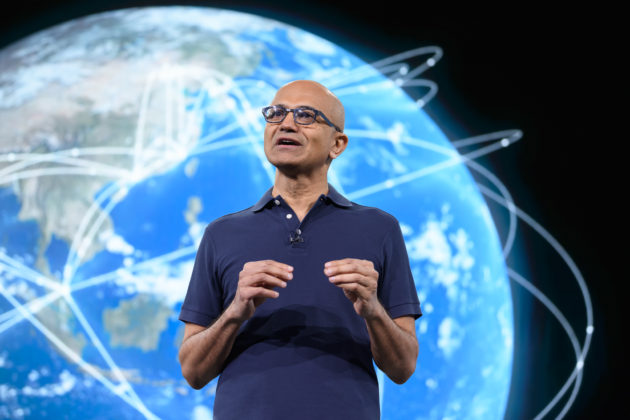
It has been five years since Microsoft CEO Satya Nadella told Harvey Mudd College President Dr. Maria Klawe — on stage at a celebration of women in computing — that women shouldn’t worry about asking for raises, and should instead rely on “good karma” and trust that the system will eventually reward their work.
The two were speaking at the 2014 Grace Hopper event in Phoenix, Ariz., organized by the Anita Borg Institute for Women and Technology, and the Association for Computing Machinery. Klawe immediately differed with Nadella’s comments. Amid the controversy afterward, he apologized and said he was wrong.
Today, Klawe considers it “one of the best things that ever happened for Microsoft.”
“They’re currently the most successful tech company in the world,” Klawe told GeekWire last week, before her commencement address at the University of Washington Allen School for Computer Science & Engineering.
“They have the largest market cap. It’s just been incredibly successful under Satya’s leadership.” One reason, she said, is “they came back from that Hopper conference with a new understanding of what diversity and inclusion actually meant.”
Nadella’s gaffe occurred when Klawe asked what his advice is for women who are uncomfortable asking for a raise. Nadella said that women should trust that the system will give the right raises to deserving employees eventually.
“That might be one of the additional superpowers that, quite frankly, women who don’t ask for a raise have,” he said. “Because that’s good karma. It’ll come back because somebody’s going to know that’s the kind of person that I want to trust. That’s the kind of person that I want to really give more responsibility to. In the long-term efficiency, things catch up.”
The remarks rang hollow at Hopper and ignited controversy online. Klawe, a lifelong champion for women in tech, disagreed with Nadella during the interview. She offered her own advice for women in that position, noting that in her career, there were times when she didn’t ask for the salary she thought she deserved.
“First of all, do your homework,” she said. “Make sure that you actually know what a reasonable salary is when you’re being offered a job, do not be as stupid as I was. Second thing is, roleplay. Sit down with someone you really trust, and practice asking them for the salary you deserve.”
Nadella apologized for his comments on Twitter and in an email to employees:
I answered that question completely wrong. Without a doubt I wholeheartedly support programs at Microsoft and in the industry that bring more women into technology and close the pay gap. I believe men and women should get equal pay for equal work. And when it comes to career advice on getting a raise when you think it’s deserved, Maria’s advice was the right advice. If you think you deserve a raise, you should just ask.
In his 2017 book, “Hit Refresh,” Nadella reflected candidly on the incident and explained how it led to change at the company, including a decision to link a portion of executive compensation to diversity improvements inside the technology giant.
“If you want to see what flapping around looks like, do a search for me and karma,” Nadella wrote. “In some ways, I’m glad I messed up in such a public forum because it helped me confront an unconscious bias that I didn’t know I had, and it helped me find a new sense of empathy for the great women in my life and at my company.”

Since then, the company has been slowly making progress in increasing the number of women and people of color in its workforce. But there have been setbacks. In April, an email chain of women at Microsoft detailing stories of sexual harassment leaked.
Klawe, a noted computer scientist and academic leader, was on the Microsoft board for six years, stepping down in 2015. She said she believes Microsoft now thinks of diversity as a strategic advantage.
That cultural shift is due, in part, to Nadella’s hard lesson, she said.
“That doesn’t mean it’s perfect,” she said. “But I know for sure that Satya, Kathleen Hogan, who’s the EVP for HR, Amy Hood, many of the other leaders at Microsoft, they think of this idea of being able to attract diverse people, make them successful, retain them, as one of their top levers for success that they have. I am just so proud of what has happened at Microsoft in the last several years.”
Listen to a GeekWire podcast with Maria Klawe above, and read highlights here, including her advice for computer science grads, and a broader discussion of the opportunities and challenges facing the technology industry.



